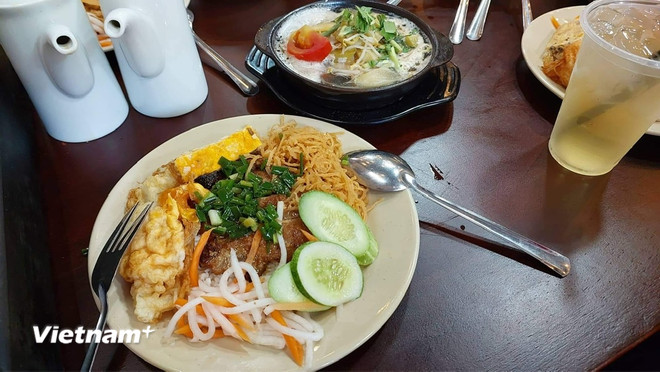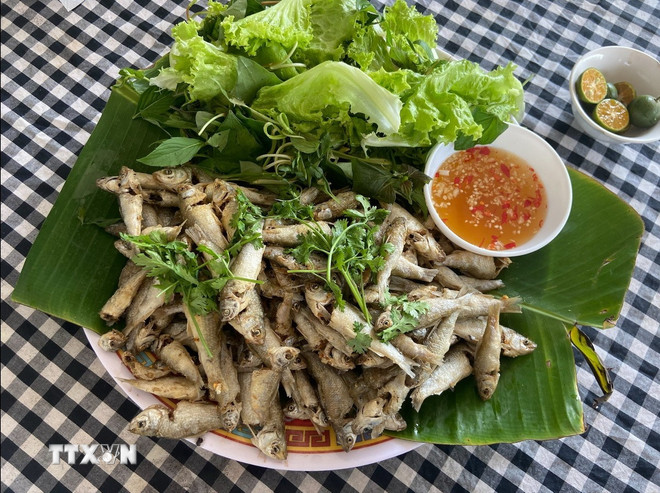Experiencing culture through cuisine is becoming a popular travel trend. Regional specialties, cooking methods, and ingredients offer tourists many unexpected experiences during their exploration journey.
Many dishes have become special cultural ambassadors, helping tourists better understand the history, customs, and lives of the local people.
Leveraging this strength to promote culture and develop tourism effectively is the topic addressed by VNA reporters in a series of articles titled "Developing Tourism Products from 'Special Ambassadors'."
Lesson 1: Cultural Stories from Food
From a cultural tourism perspective, cuisine is not just about simple dishes, but also reflects the culture, customs, and traditions of the people. Therefore, exploiting the cultural values of cuisine to serve the development of tourism is a strategic direction, creating attractive products and promoting sustainable tourism development associated with preserving and honoring local culture.
Identity formatting
For every country and region, food and drink are always attractive tourism products. Alongside scenery, accommodation, and climate, cuisine plays a crucial role, creating a unique identity for each destination.
According to Master Pham Trinh Hong Phi from Van Hien University, each country and region has a unique culinary heritage, which influences the image and perception of that country among tourists.
Exploring culinary heritage and food is one of the key motivators influencing travel decisions. The flavors of the food encountered during a trip often leave lasting memories.
Similarly, two Master's students, Sui Nghiep Phat and Do Le Phuc Hung Thinh (Hung Vuong University), both agreed that enjoying local culinary specialties and listening to stories related to the history and customs associated with the dishes can be considered a "window" into the culture and history of the destination, thereby creating a connection with the local culture in the minds of tourists.
Mr. Chu Hong Minh, Chairman of the Vietnam Restaurant Association, emphasized that cuisine is a competitive advantage and an important driving force in building a national brand. A signature dish or a complete culinary experience not only brings satisfaction but also creates beautiful memories that make tourists want to return.

In the context of globalization, each destination needs to tell its own story about its people, culture, and identity to create a distinctive and sustainable brand.
Citing Ho Chi Minh City as an example, Dr. Doan Manh Cuong from Nguyen Tat Thanh University argues that the city, as a leading economic, cultural, and tourism center in Vietnam, possesses a rich and diverse culinary culture, reflecting the more than 300-year history of development in the South.
The culinary culture in the city is not only about the art of preparing dishes but also a symbol of cultural exchange, creativity, and the open-minded spirit of its people.
Leveraging the cultural value of cuisine to develop unique tourism products not only enhances the visitor experience but also promotes sustainable economic development, preservation, and promotion of local cultural heritage.
Dishes like vermicelli, pho, banh mi, and broken rice not only satisfy culinary needs but also tell stories about the history, people, and creativity of the city.
It's not just about enjoyment.
During his trip to the Mekong Delta last September, Mr. Dinh Van Truong from Ha Dong ward, Hanoi, said he was very surprised and delighted to participate for the first time in picking water hyacinth flowers and catching snakehead fish during the flood season. Afterwards, he prepared and enjoyed local specialties like snakehead fish hotpot and battered fried snakehead fish in a rural setting, listening to the witty folk verse, "Water has no legs, so how can it be called standing water? Fish has no worship, so how can it be called snakehead fish...?"

According to Vietravel Tourism Joint Stock Company, tours exploring the Mekong Delta are always popular with tourists thanks to the combination of sightseeing, visiting historical sites, and experiencing agricultural and fishing life, as well as enjoying local specialties.
Beyond simply introducing tourists to food and drinks, tours and itineraries also focus on connecting and taking visitors to explore activities such as harvesting agricultural products, seafood, and fruits; chatting with artisans and locals; learning about ingredient selection and food preparation; and enjoying meals in a suitable setting. This provides tourists with a range of emotions related to the culture, history, and people of the region, along with the satisfaction of enjoying a delicious meal.
Introducing the museum tour and the journey to explore the history of the formation and development of the wax coconut tree in Tra Vinh (now part of Vinh Long province), Ms. Lam Ngoc Tu, representative of Cau Ke Wax Coconut Processing Co., Ltd. - the investor and operator of the Wax Coconut Museum in Tam Ngai commune, said that tourists on the "Legend of the Wax Coconut" tour often express satisfaction and delight at being able to wear the traditional costumes of the Khmer people, admire the century-old wax coconut tree, many valuable artifacts, and listen to the story of the person who brought the first wax coconut tree to be planted in the locality.
In addition, many tourists are particularly excited about experiential activities such as peeling the waxy coconut, wrapping candy, preparing fresh waxy coconut water, and enjoying waxy coconut noodle soup - which won first prize in the "100 Dishes from Waxy Coconut" competition within the framework of the 100th Anniversary of the Vietnamese Waxy Coconut Tree Festival held in August 2024.
Referring to the importance of investing in the development of culinary tourism products to increase the attractiveness of destinations, Ms. Vu Thi Nhung (Ho Chi Minh City University of Culture) emphasized that culinary culture is a bridge to identifying national identity through the selection of ingredients, use of spices, processing techniques, and eating habits.
According to statistics from the World Tourism Organization, approximately 320 million tourists choose culinary tours for their trips each year, and each tourist typically spends an average of one-third of their total trip cost on food-related activities.
Nguyen Trung Khanh, Director General of the Vietnam National Tourism Administration, affirmed that Vietnam has rich potential for tourism development, with cuisine being a prominent value, embodying the culture of various regions. Culinary tourism needs to be prioritized for development to enhance Vietnam's competitiveness and tourism brand.
Lesson 2: Ensuring every culinary experience leaves a lasting impression on visitors.
Source: https://www.vietnamplus.vn/cau-chuyen-van-hoa-tu-cac-mon-an-post1066318.vnp







![[Photo] National Assembly Chairman Tran Thanh Man visits and works with the National Assembly Committees and the State Audit Office.](https://vphoto.vietnam.vn/thumb/1200x675/vietnam/resource/IMAGE/2026/02/23/1771848141941_ndo_br_bnd-6798-jpg.webp)











































































































Comment (0)